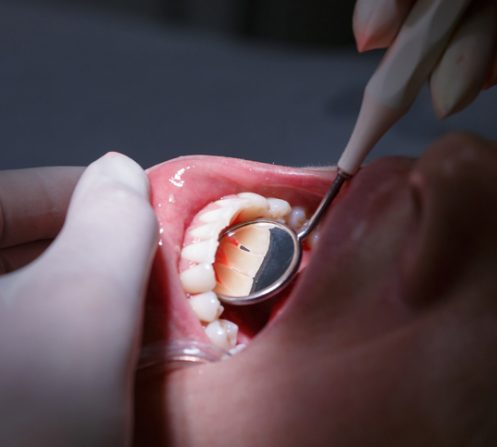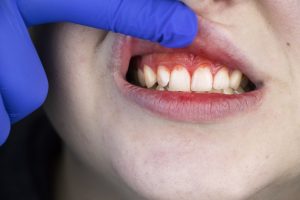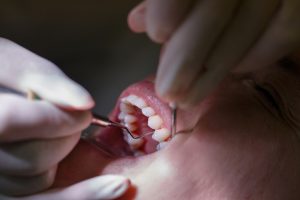
Ailments that threaten your oral health can have a huge toll on your general health. Among the most common oral diseases is periodontal (gum) disease. Additionally, this disease is the major cause of tooth loss among adults.
So, what is periodontal disease? This is a bacterial infection that attacks the tissues that support your teeth.

Chronic Gingivitis: This is the stage where gum disease manifests itself. The symptoms include inflammation, bleeding gums and redness. At this stage, it is quite mild and can be reversed.
Aggressive Gum Disease: At this stage, patients experience loose gums and bone damage which occurs rapidly.
Chronic Gum Disease: This is the most common form of gum disease which advances at a slow rate.
Necrotizing Gum Disease: This stage is caused by the death of tissues connecting the tooth and the jaw. At this stage, the symptoms experienced are pain, bleeding gums and bad odor.
There are various causes of periodontal gum disease. Some of the causes are a result of your own undoing whereas some are unavoidable. Below are the causes of periodontal disease.
Poor Oral Hygiene: This is arguably the leading cause of periodontal disease. Failure to properly clean your mouth leaves plaque that causes gingivitis which in return graduates to become periodontal disease.
Medication: Medication can prove to be an unexpected cause of periodontal disease. Some medications cause a reduction in saliva which leaves your mouth dry. Moreover, there are medications that can directly affect your gums by causing abnormal growth. This poses a great health risk to your gums.
Hormonal Changes: Hormonal changes can have adverse effects on your gums. Most of these hormonal imbalances may occur at stages such as puberty, menopause or pregnancy. If these imbalances impact your mouth, then you are at high risk of contracting periodontal disease.
Ailments: Various ailments that are not associated with your dental hygiene can trigger a bacterial infection that can affect your gum. Patients who suffer from diseases like stroke, kidney disease, heart attacks and diabetes are at high risk of suffering gum disease.
Clenching Jaws: People who are fond of clenching their jaws are likely to suffer periodontal disease. Clenching jaws causes the teeth to grind and this may affect the tissues on the jaw. If the tissues can no longer handle the pressure, then this can be the onset of periodontal disease.

When periodontal disease starts setting in, there are various symptoms that will indicate the extent of the infection. These symptoms include:
The first step to any treatment process is usually the prevention stage. Periodontal disease can be very painful and discomforting especially at the advanced stage. To avoid the painstaking process of treating periodontal disease, you need to embrace these habits:
Healthy Oral Hygiene: Keeping your mouth clean is all about creating an environment where bacteria cannot thrive. Ensure your brush your teeth twice a day using fluoride toothpaste for at least two minutes. Before you start brushing your teeth, you might consider rinsing your mouth to loosen any bacteria or food particles.
Dental Checkups
Brushing your teeth does not guarantee a safe landing. Regular dental checkups will come in handy to ensure that you are free of any gum infection. Furthermore, checkups will help with early diagnosis in case of an infection.

Your dental health is essential for your overall well-being. Gum disease can cause serious pain and discomfort. In the worst-case scenario, you could even lose your teeth. So, why should you seek treatment for gum disease?
Keep Your Teeth Intact: As periodontal disease advances, you will notice your teeth becoming loose and some will even start falling off. Although such a situation is irreversible, you can find treatment to save your teeth. However, it is important that you visit your dentist as soon as you notice any sort of infection in your mouth.
Regain Your Confidence: Infected gums can quickly eat into your self-esteem. The pain and symptoms that come with periodontal disease often force many patients to give up their normal way of life. But with treatment, your condition can be rectified and this will prove to be a major boost to your confidence.
Avoid Future Infections: With proper gum disease treatment, you no longer need to worry about future infections. Gum disease treatment will get to the root cause of the infection and provide a long-lasting solution.
There are various procedures that can be adopted in the treatment of gum disease. The procedure adopted by your dentist will be influenced by the extent of your disease.
Non-Surgical Procedure: This procedure is mostly adopted for cases that are not advanced. The dentist will simply scrap and remove the plaque from your tooth. Thereafter, any roughness on the roots is removed to minimize the risk of bacterial infection to the gum. This process allows your gums to heal and hold the teeth firmly.
Flap Surgery/Pocket Reduction: For advanced cases, pocket reduction might be the ideal solution. This involves the dentist folding back the tissue on your gums to remove any bacteria and remove roughness on the damaged jaw. With time, the healed tissue will attach to the jaw.
Gum Crafting: If the roots of your teeth are exposed, then gum crafting will prove to be the ultimate procedure. This procedure involves covering the exposed roots using gum tissues. These tissues can be sourced from your palate or an external source. This procedure will help reduce teeth sensitivity and protect further tooth decay.
Removing Abscess: When a red swollen abrasion appears on your gum, the perfect remedy is abscess treatment. This process involves draining the abrasion and cleaning the affected area. Antibiotics will also be prescribed to mitigate the chances of another infection.
Bone Grafting: This procedure is recommended for patients whose jaw bone has been corrupted by the gum disease. Under this treatment, your dentist will clean the infected area and replace the infected bone with synthetic or natural bone. In addition, tissue-restorative proteins will be used to help enhance bone and tissue growth.
Periodontal disease has for a long time been a cause of distress for many patients. Fortunately, medical advancements have made it possible to treat this ailment. However, the best way to avoid being a victim of gum disease is to safeguard your oral health. But in case of unavoidable causes, be sure to visit Dr. Mal Braverman for the best cause of action.